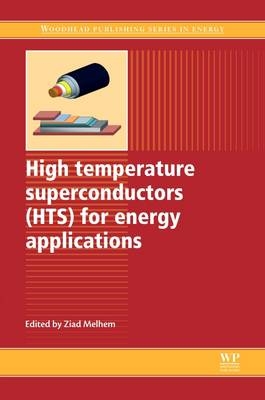
High Temperature Superconductors (HTS) for Energy Applications
Woodhead Publishing Ltd (Verlag)
978-0-85709-012-6 (ISBN)
High temperature superconductors (HTS) offer many advantages through their application in electrical systems, including high efficiency performance and high throughput with low-electrical losses. While cryogenic cooling and precision materials manufacture is required to achieve this goal, cost reductions without significant performance loss are being achieved through the advanced design and development of HTS wires, cables and magnets, along with improvements in manufacturing methods. This book explores the fundamental principles, design and development of HTS materials and their practical applications in energy systems.Part one describes the fundamental science, engineering and development of particular HTS components such as wires and tapes, cables, coils and magnets and discusses the cryogenics and electromagnetic modelling of HTS systems and materials. Part two reviews the types of energy applications that HTS materials are used in, including fault current limiters, power cables and energy storage, as well as their application in rotating machinery for improved electrical efficiencies, and in fusion technologies and accelerator systems where HTS magnets are becoming essential enabling technologies.With its distinguished editor and international team of expert contributors, High temperature superconductors (HTS) for energy applications is an invaluable reference tool for anyone involved or interested in HTS materials and their application in energy systems, including materials scientists and electrical engineers, energy consultants, HTS materials manufacturers and designers, and researchers and academics in this field.
Dr Ziad Melhem is Key Accounts Manager at Oxford Instruments (OI), UK. He is widely regarded for his work in applied superconductivity, with over 20 years' experience in superconductivity and cryogenics including low and high temperature superconductor materials and applications.
Contributor contact details
Woodhead Publishing Series in Energy
Dedication
Preface
Part I: Fundamental science and engineering of high temperature superconductor (HTS) materials and components
Chapter 1: Fundamental issues in high temperature superconductor (HTS) materials science and engineering
Abstract:
1.1 Introduction
1.2 Fundamental superconductor physics
1.3 Types, properties and performance of HTS materials
1.4 Manufacturing methods for HTS materials
1.5 Challenges and future trends
1.6 Conclusions
Chapter 2: High temperature superconductor (HTS) wires and tapes
Abstract:
2.1 Introduction
2.2 Challenges with high temperature superconductor (HTS) wires and tapes
2.3 Manufacturing scale-up of 2G HTS tapes and prototype devices
2.4 Future of HTS wires and tapes and current research focus
2.5 Conclusions
Chapter 3: High temperature superconductor (HTS) cables
Abstract:
3.1 Introduction
3.2 Short survey on properties and availability of technical long length high temperature superconductors (HTS)
3.3 Basic requirements for cables for different applications
3.4 HTS cable configurations
3.5 Future trends and challenges
3.6 Conclusions
Chapter 4: Bulk high temperature superconductor (HTS) materials
Abstract:
4.1 Introduction
4.2 Design of bulk high temperature superconductor (HTS) materials
4.3 Development and application of bulk HTS materials
4.4 Challenges and future trends
4.5 Technological and commercial barriers to adoption of bulk superconductors
4.6 Future trends
Chapter 5: High temperature superconductor (HTS) magnets
Abstract:
5.1 Introduction
5.2 Electromagnets
5.3 Superconducting magnets
5.4 Superconducting wires
5.5 Examples of HTS magnets
5.6 Future trends
5.7 Conclusions
5.8 Acknowledgements
Chapter 6: Cryogenics for high temperature superconductor (HTS) systems
Abstract:
6.1 Introduction
6.2 Cooling methods for superconducting magnets
6.3 Cryogenics issues: cooling sources, heat sources and measurement
6.4 Cryostat construction
6.5 Cooler performance
6.6 Thermometry
6.7 Development and applications of cryogenics for HTS systems
6.8 Challenges and requirements
6.9 Typical guidelines for cryogen-free magnet systems
6.10 Conclusions
6.12 Acknowledgement
Chapter 7: Electromagnetic modeling of high temperature superconductor (HTS) materials and applications
Abstract:
7.1 Introduction
7.2 Overview of modeling approaches for HTS materials
7.3 Modeling methods for DC conditions
7.4 Modeling methods for AC conditions
7.5 Future challenges and trends
7.6 Conclusions
7.7 Acknowledgment
Part II: Application of high temperature superconductor (HTS) materials and components in energy systems
Chapter 8: Superconducting fault current limiters and power cables
Abstract:
8.1 Introduction
8.2 Fault current limiters
8.3 Superconducting power cables
8.4 Conclusions
Chapter 9: Superconducting magnetic energy storage (SMES) systems
Abstract:
9.1 Introduction
9.2 Superconducting magnetic energy storage (SMES) systems limitations
9.3 Superconducting magnet
9.4 SMES uses and history
9.5 Conclusions
9.6 Acknowledgments
Chapter 10: Application of high temperature superconductor (HTS) technology in rotating machinery
Abstract:
10.1 Introduction
10.2 Types, properties and performance of high temperature superconductor (HTS) generators and motors
10.3 Fundamental design and development issues for HTS generators and motors
10.4 Key requirements for successfully applying HTS technology
10.5 Challenges and future trends
10.6 Conclusions
Chapter 11: High temperature superconductors (HTS) in fusion technologies
Abstract:
11.1 Introduction
11.2 Magnetic field and magnet current density considerations for a fusion reactor
11.3 Operating temperature of the magnet system
11.4 Indications for the cooling system of the fusion reactor magnet system
11.5 Potential HTS conductors and superconducting material for future fusion reactors
11.6 HTS current leads
11.7 Conclusion
Chapter 12: High temperature superconductors (HTS) in accelerator systems
Abstract:
12.1 Introduction
12.2 Fundamental issues for HTS in accelerators
12.3 Types, properties and development of HTS for accelerators
12.4 Applications of HTS in accelerators
12.5 Challenges and future trends
12.6 Conclusions
12.7 Sources of further information and advice
Index
| Reihe/Serie | Woodhead Publishing Series in Energy |
|---|---|
| Verlagsort | Cambridge |
| Sprache | englisch |
| Maße | 156 x 234 mm |
| Gewicht | 810 g |
| Themenwelt | Technik ► Elektrotechnik / Energietechnik |
| ISBN-10 | 0-85709-012-7 / 0857090127 |
| ISBN-13 | 978-0-85709-012-6 / 9780857090126 |
| Zustand | Neuware |
| Haben Sie eine Frage zum Produkt? |
aus dem Bereich


